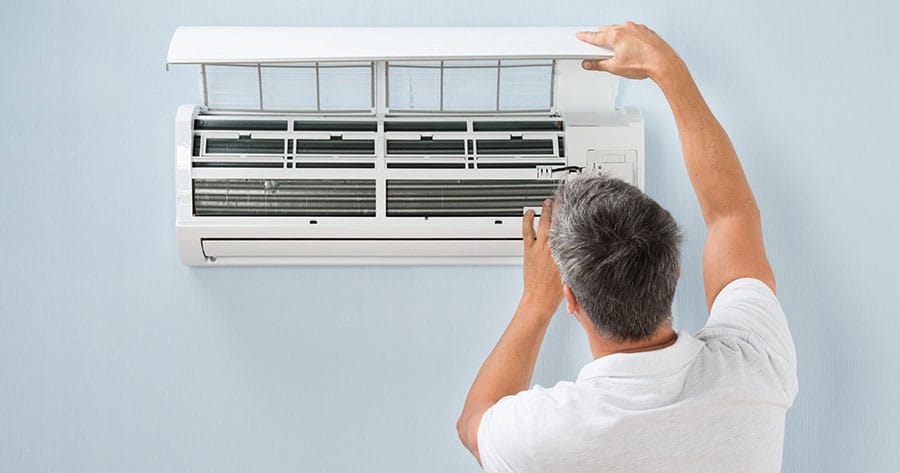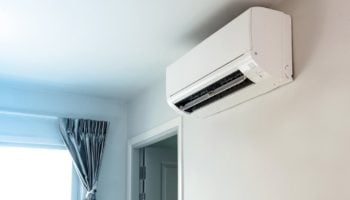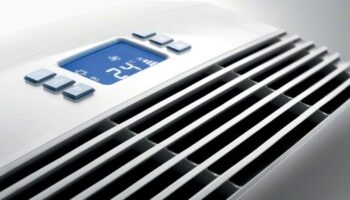We've independently reviewed this article to make sure it's as accurate as we can make it.
To find out more about our article creation and review process, check out our editorial guidelines.
When weighing up a whole-home cooling system, it’s easy to get stuck between a ductless mini-split system, or traditional central air conditioning.
They both sound so similar, and to inexperienced individuals, might seem like they do exactly the same thing. However, there are many differences between them that must be taken into account.
Which system to use depends on your home. You should buy a Central Air Conditioning system if you already have ducts installed. And if not, then avoiding the ductwork cost makes a ductless system much cheaper and quieter.
Keep reading to find out which one is better for you!
Comparing Ductless & Central Air Conditioning
For a full comparison, let’s take each system based on their various performance categories.
Try to consider which of the categories would be most important to you (for example, price vs. zone control). You can then put more importance on the system that performs best for those categories.
Price (Central AC)
The big talking point first. There’s a few considerations to be had when it comes to dollars spent on these cooling systems.
As mentioned above, the main conclusion is that ductless is cheaper if you don’t have ducts. If you already have ductwork installed, go with a central conditioning system.
Typically, a professionally installed ductless system will set you back between $1-2k for one inside unit, and one outside unit. This increases by around $5-700 for each additional inside unit.
For heating-capable mini-split units, the initial cost is around the same, but these can be a bit harder to source.
Alternatively, a central air system will cost somewhere between $4,000-$7,000 – without ducts. As a (very) rough estimate, double that to include the cost for ducts.
A key point is that ductless systems are generally cheaper to run. You can focus the cooling, and they’ve got less efficiency loss due to issues with ducts. They also need much less maintenance over time.
So, while the upfront cost may be higher for a ductless system, their efficiency, and low maintenance will save you money in the long run.
Central AC does have one last trump card, however. Having a full system installed can increase the value of your home by up to 10%.
Efficiency (Ductless) & Power (Central)
I just spilled the beans above, but ductless systems are more efficient, generally than central air. This is mostly due to leaky air ducts losing air, as opposed to tight, small conduit tubes that are well-sealed.
That said, ductless systems are not as powerful as a central AC setup. Especially with added inline duct fans. As a general rule of thumb, if your total square footage of cooling is above 2,000 sq. ft [DrHVAC], you’re in central air conditioning territory. While smaller spaces can take advantage of the focused cooling offered by a ductless system, overly large spaces need the power of a full-sized furnace.
Ductless manufacturers do also make ducted units, so where possible you can mix a ducted and ductless system depending on what suits your current ductwork. In other words, you can combine the two to install ductless units in additional rooms, while still utilizing your ducts and traditional central air system.
Noise (Ductless)
Central air conditioning units don’t have to be noisy. At least not that you can hear. If you can keep the main unit in the basement or attic – it’s not too much of a bother. However, ductless systems are still unbeatable in quietness.
Having a noisy compressor in the unit that sits outside your home, means you’ll typically enjoy a quieter home environment.
That said, some modern central AC systems are getting much quieter, while some shoddy ductless systems may not be. Always check the specifics, or ask a specialist, once you’re getting close to choosing.
Installation (Ductless)
This is a big one. No matter how it’s done, central air conditioning is a pain to install. EVEN if you already have a full set of working ducts, you’re still needing to install a big, bulky system within your home. This should always be done with professional help.

In many cases, mini split air cons are easy to install. This is especially true when you can place an outdoor unit close to an indoor one, with the possibility of providing power to each. Adding distance, power requirements, and multiple units are what will increase the complexity and cost of installation.
Another great aspect is the control you have. You can choose exactly where you want your cooling power to be installed, allowing you to get the most out of your home and save the most on your energy bills.
Zone Control (Ductless)
Both mini-split and central aircons can offer you zone control. The better option? Ductless.
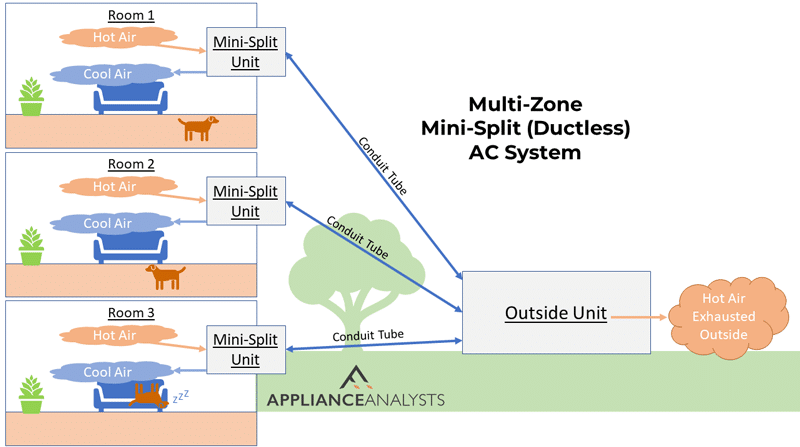
For a central system to vary the cooling per room, it typically requires a zoning system with motorized dampers and a control system that opens and closed to send air to the desired zones. This cost can add up quickly.
If you’re budget-conscious, a mini-split system can do this in a cinch. With individual cooling units come varying, controllable temperatures.
This isn’t just great for saving you money on bills. It’s also a big bonus for the family. If one person loves a cool bedroom while you want to keep the living room a bit warmer, it’s no problem. No more fighting over the thermostat!
Pros & Cons of Ductless & Central Air Conditioning
To give a quick overview, I’ve covered just about every pro and con there is for both systems in the tables below.
| Mini-Split Air Conditioners | |
|---|---|
| Pros | Cons |
Can control cooling per room | Doesn’t bring in fresh air |
Better/cheaper if retrofitting without ductwork | More expensive than ducted systems (if you have ductwork) |
Easier to install. Doesn’t weigh much. | Visible inside the home. |
Multiple options – wall mounted, ceiling recessed, etc. | May need multiple to cover whole home. |
Often comes with heater element for winter. | |
20-30% more efficient than central AC. | |
Quieter than central AC. | |
| Central Air Conditioners | |
|---|---|
| Pros | Cons |
Can add value to a home | Needs regular maintenance |
Can be cheaper up-front cost | Less efficient; higher energy bills |
Zone control possible | Zone control needs high-end parts |
Brings in fresh air | Ducts can build-up pollen, mold, dust, etc. |
Hidden from view | Central unit is noisier than ductless. |
Installation can be complex/lengthy. |
|
Summary: Ductless vs Central Air Conditioning
Overall, a ductless air conditioning system is quieter, more efficient, and easier to install than central air conditioning. Ductless systems also offer better zone control, but this can be expensive. Central air conditioning systems hold more power than ductless and can add value to your home.
Other Factors to Consider
Lastly, there’s a few other aspects to consider. I’ll quickly go through them:
1. Looks. Central AC operates using (mostly) hidden vents, while a ductless system does need a unit inside your room. While this can be recessed into the ceiling or wall, a standard wall-mounted unit is likely the easiest solution. That said, these units do look modern and don’t exactly ruin the feel of a space.
2. Heating. If you live in a cooler climate, bear in mind that a mini-split system can offer you heating, too. Depending on your area, heating can be a common addition to a system that doesn’t come at an increased cost.
3. Allergies. An unfortunate downside of air ducts is that they get dirty over time. Pollen, mold, dust, and even animal droppings can accumulate within them! These can be horrible not only for the smell but also for anyone with allergies like hay fever. A good ductless system has efficient, easy-to-clean filters that keep your air fresh. However, they don’t bring in…
4. Fresh Air. As good as filters may be, there’s nothing as refreshing as fresh air. The air ventilation you get from a central conditioner isn’t possible with a ductless alternative, which uses your inside air only. That being said, ductless installations using a ‘ceiling cassette’ does have accessories that help bring in the fresh air.
Other Types of Air Conditioning
As well as ductless and central air conditioning, there’s plenty of other options out there.
Have you considered using window or portable units? Many think these one-stop units suffer from a lack of power or control, but modern models beg to differ.
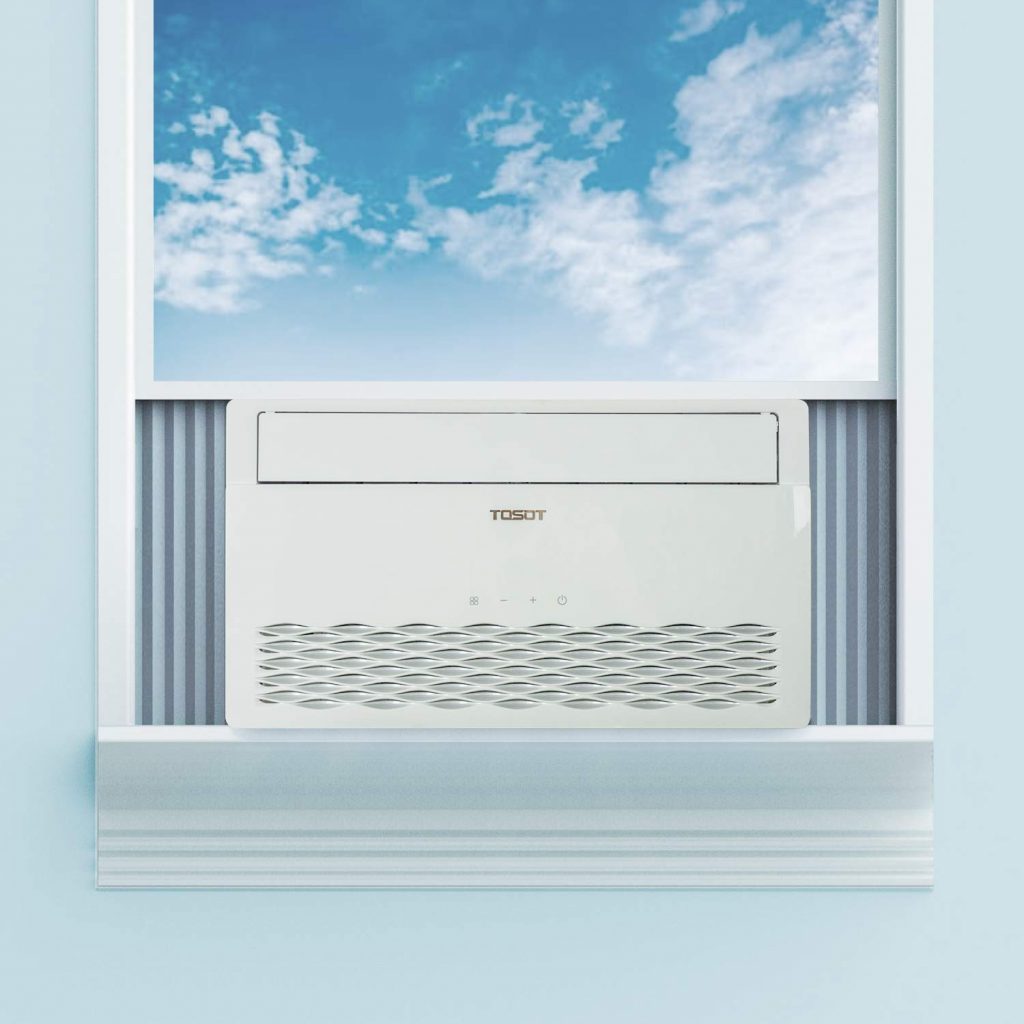
With remote controls, thermostats, Wi-Fi connectivity, and programmable timers – portable and window air conditioners can be a fantastic option for the right space.
If you own a small home or an apartment, these could be a fantastic (and far cheaper) option than going for a full ductless or central air conditioning system.
Conclusion
Mini-split and central air systems are a key choice for any homeowner. They’re a huge investment, and can even affect the value of your home!
I hope this guide has helped you consider which one’s best for you personally.
Again – the consensus is to go with central air conditioning if you already have air ducts, or ductless if you don’t. Neither are a bad choice, though – as we see more and more of the quieter, more efficient ductless systems get installed around the country.
If this guide’s helped you, please consider supporting us by checking out some more articles below!
Have a great day.
— Craig.
Frequently Asked Questions
How Often Should I Have My AC Systems Serviced?
Ideally, you’ll want your Air Conditioning systems to be serviced at least once every year by a professionally certified HVAC technician.
This will not only ensure that your appliance is running efficiently and providing as much heating-cooling as possible but also increase its lifespan significantly.
How Can I Make My AC More Efficient?
There are many ways in which you can increase the efficiency of your AC system.
Some of the most effective methods are checking for air leaks around your windows and door frames, as well as keeping the unit’s filters clean. Making sure that you’re using the right-sized appliance for the area you want to cool down/heat up is also key.
How Much Power Does the Average Ductless AC System Use?
It might be more or less depending on the settings you’re using and the size of the unit itself. However, on average, you can expect a consumption of anywhere between 700-2,000 watts, which, if left running for an hour, translates to .7 to 2 kWh.
How Long Should an Air Conditioning System Last?
Depending on how well you take care of it, how often you give it maintenance/servicing, and your user habits, you might be looking at anywhere between 10–15 years.
